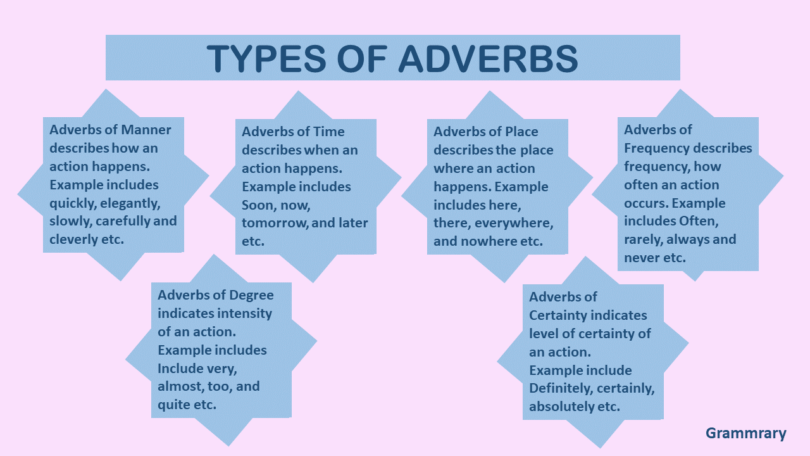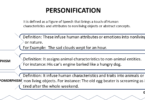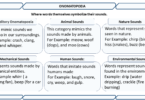Introduction of Adverbs and Types of Adverbs:
Exploring Adverbs and Types of Adverbs plays a vital role in understanding Part of Speech in English Grammar. The word “adverb” evolved from the Latin word “adverbium”, the word “adverbium” is made up of two words, ad means to, and verbium means verb. Adverbium is defined as a word that is added to a verb. The Latin term “adverbium” evolved into the Middle English term, “adverbe,” and it gradually evolved into the modern English term “adverb.”
Language keeps on evolving, and the term “adverb” now represents an important element of speech. It is used to modify verbs, other adverbs or adjectives. Adverbs convey information about state or action being described.
Definition of Adverbs:
Adverbs are an important part of speech that describe adjectives, verbs or other adverbs. They answer questions such as when, how, what, or where an action occurs. Adverbs play an important role. They add information, enhance clarity and facilitate communication in the English language.
Adverbs, an essential component of Eight Parts Of Speech:
Being an essential component of Eight Parts of Speech, adverbs add depth and precision to communication. They serve the crucial role of modifying verbs, adjectives, or other adverbs, providing additional information about how, when, where, or to what extent the work is done. Let’s delve into types of adverbs and their functions.
Examples of adverbs:
Some examples of adverbs are listed below:
- Always
- Quickly
- Here
- Now
- Often
- Very
- Carefully
- Yesterday
- Daily
- Everywhere
- Definitely
- Extremely
- Late
- Possibly
- Tomorrow
- Underneath
- Too
- Probably
- Occasionally
- Beautifully
Examples of Use of Adverbs in Sentences:
- They will go tomorrow.
- The kid is hiding behind the bed.
- Sarah goes shopping occasionally.
- She always completes her tasks on time.
- He arrived late.
- We looked for the remote everywhere.
- She writes perfectly.
- He sings the song beautifully.
Types of Adverbs:
- Adverbs of Manner
- Adverbs of degree
- Adverbs of Time
- Adverbs of Place
- Adverbs of Frequency
- Adverbs of Certainty
Adverbs of Manner:
These adverbs define how an action is done. Adverbs of Manner often end in “-ly” , usually telling how something is performed. It shows the way in which an action takes place, modifying verbs and adding details about it. Adverbs of Manner answer the question “how”. THey are formed when a “-ly” suffix is added to an adjective.
Some common examples of adverbs are as follows:
- Quickly
- Loudly
- Carefully
- Slowly
- Quietly
- Happily
- Beautifully
- Sadly
- Easily
- Angrily
- Excitedly
- Patiently
- Smoothly
- Roughly
- Gracefully
- Sincerely
- Gently
- Cautiously
- Nervously
- Carelessly
Use of Adverbs of Manner in Sentences:
- She completed her homework quickly.
- Evans sings songs beautifully.
- He baked the cakes perfectly.
- The children played the game excitedly.
- The players ran fastly to the finish line.
- Hania sang the song perfectly at the concert.
- The chef cooked rice perfectly.
- She drove the car fastly along the highway.
- She spoke softly to avoid waking her husband.
- Anzel painted vividly.
- Andrew sketched perfectly.
- The professor delivered the lecture superbly in the class.
Adverbs of Time:
Adverbs of time describe the timings, when an action takes place. It often answers the “when” of a question. Adverbs of Manner modify verbs and add details related to time, such as how often, when, or for how long. Adverbs of time add details about time, durations, or frequencies. For example words like, daily, soon, yesterday, now and always. They play an important role in sentences, conveying more precise details of timing of actions.
Example of Adverbs of Time:
- Soon
- Today
- Now
- Yesterday
- Early
- Late
- Tomorrow
- Recently
- After
- Never
- Always
- Monthly
- Rarely
- Frequently
- Before
- Later
- Afterwards
- Daily
- Sometimes
- Yearly
Example of use of Adverbs of Time in Sentences:
- We went to the Emporium yesterday.
- The class is scheduled for Monday.
- We got late due to technical issues.
- They met recently at a party.
- She always completes her tasks before time.
- She visits her parents monthly.
- The training is happening today.
- Kids used to play hide and seek today.
- They go to Paris yearly.
- The bus arrives frequently during rush hours.
- She rarely misses her class.
- I saw her at the shopping mall in the evening.
- The magazine is published daily.
- The Annual Dinner occurs annually.
- She returns from the office late in the evening.
- I go for a walk every morning.
Adverb of Place:
These describe the location where an action happens. They provide information about place or loacation, an action is happening. Here are some examples:
- Across
- Along
- Ahead
- In
- Around
- Above
- Away
- Behind
- Back
- Abroad
- Inside
- Near
- Here
- Nearby
- Below
- Beneath
- Beside
- Between
- Beyond
- Downstairs
- Outside
- Over
- There
- Up
- Within
Use of Adverbs of Place in Sentences:
- She put keys there on the kitchen rack.
- She placed the notebook here on the table.
- The fragrance of perfume filled the air everywhere in the room.
- We set up our tent nearby the beach for a peaceful night.
- The moon was shining far above the horizon.
- Birds were flying above the buildings.
Adverbs of Frequency:
Adverbs of frequency show how many times an action occurs. They modify verbs and answer questions how frequently something is done. It describes how frequently or how often something happens. Adverbs of frequency convey the frequency of an activity.
Examples of Adverbs of Frequency:
- Always
- Frequently
- Often
- Continuously
- Usually
- Occasionally
- Sometimes
- Constantly
- Rarely
- Hardly ever
- Seldom
- Weekly
- Never
- Regularly
- Monthly
- Daily
- Yearly
- Periodically
- Intermittently
- Infrequently
Use of Adverbs of frequency in Sentences:
- She always arrives at the office early.
- We go for a morning walk daily.
- He rarely misses his class.
- I take the bus to school daily.
- They visit their grandparents on weekends.
- She exercises daily at the gym.
- We hardly ever see Mr. and Mrs. Lee at party.
- He never missed his class.
- She never takes breaks during office hours.
Adverbs of Degree:
Adverbs of degree are defined as words that modify adjectives or other adverbs. They convey the extent or intensity of an action. Common examples include very, too, and quite.
Example of Adverbs of Degree:
- Too
- Very
- Almost
- Quite
- So
- Absolutely
- Rather
- Enough
- Totally
- Extremely
- Partly
- Nearly
- Barely
- Completely
- Partially
- Too much
- Much
- Perfectly
- More
- Little
- Almost
- Less
- Entirely
- Fully
- Absolutely
- Rather
- Just
- Totally
- Entirely
- Exactly
Use of Adverbs of Degree in Sentences:
- She is very happy to receive the gift.
- The tea is too hot to drink immediately.
- The task is quite tough, but it’s worth it.
- He is always ready for meetups.
- She is absolutely confident of her decision.
- The soup is too spicy.
Adverbs of Certainty:
Adverbs of Certainty is a Type of Adverb that exhibit the level of certainty of an action.
Examples of Adverbs of Certainty:
- Definitely
- Certainly
- Absolutely
- Surely
- Undoubtedly
- Positively
- Unquestionably
- Clearly
- Indeed
- Certainly
- Obviously
- Confidently
- Without a doubt
- Assuredly
- Certainly
- Clearly
- Without question
- Truly
- Irrefutably
- Surely
Use of Adverb of Certainty in Sentence:
- I will definitely attend the session.
- She is definitely the most qualified person to be selected as a trainee.
- I can certainly say that she will be on time.
- His results are undoubtedly perfect.
- Certainly, we can go for coffee today.
- You are perfectly right.
Tabular Form of Type of Adverbs:

Types of Adverbs with Definition and Examples
| Sr no | Type of adverb | Definition | Examples |
| 1 | Adverbs of Manner | It describe how a work is done | Quickly, elegantly, fastly, slowly, carefully and cleverly etc. |
| 2 | Adverbs of Time | These adverbs describe when timings of action take place. | Soon, now, tomorrow, and later etc |
| 3 | Adverbs of Place | These describe the place an action occurs. | Here, there, everywhere, and nowhere etc |
| 4 | Adverbs of Frequency | Adverbs that express frequency, how many times anything is done. | Often, rarely, always and never etc |
| 5 | Adverb of Degree | It modifies other adverbs or adjectives, indicating the intensity of the action. | Include very, almost, too, and quite etc |
| 6 | Adverbs of Certainty | They exhibit the level of certainty of an action. | Definitely, certainly, absolutely |







